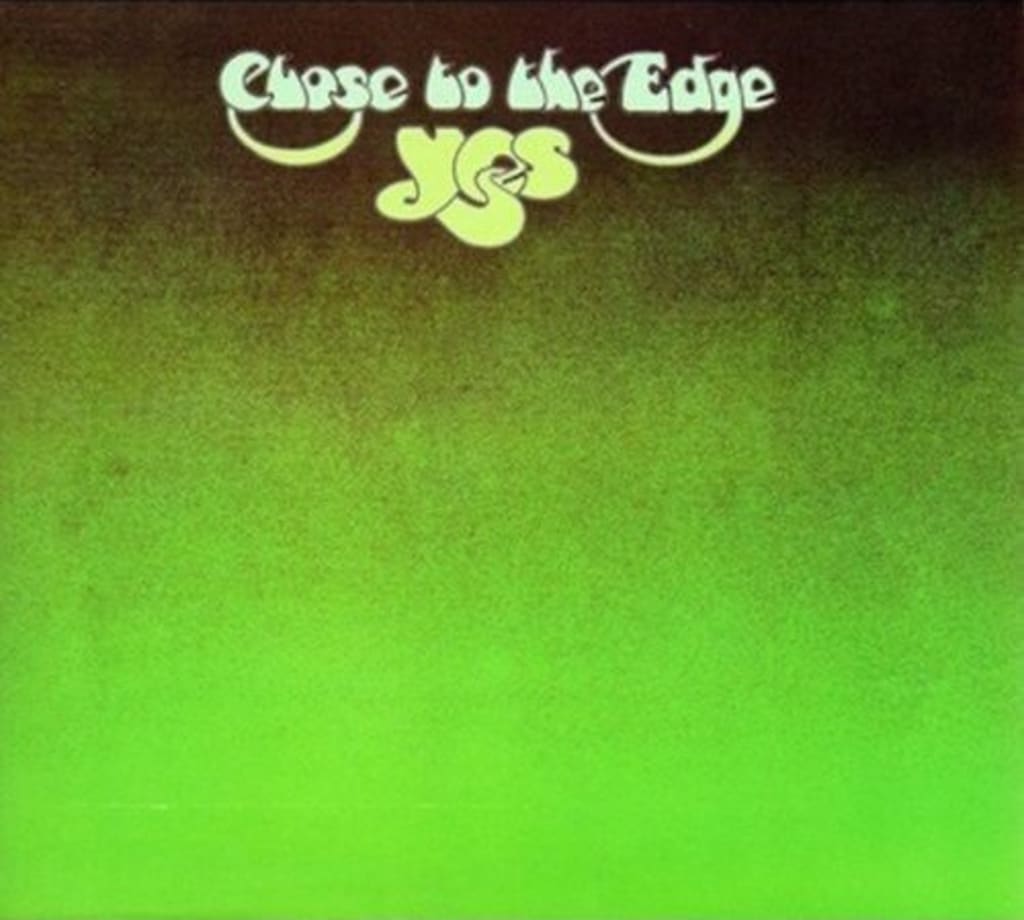'Close to the Edge' - Taste the Fruit of Yes Recorded
An Album for You and I

Following Fragile and subsequent touring, the Yes lineup of Jon Anderson (vocals), Bill Bruford (drums), Steve Howe (guitar), Chris Squire (bass), and Rick Wakeman (keyboard) returned to the studio in 1972. For The New Age of Atlantic, they recorded a 10-and-a-half-minute cover of Simon & Garfunkel's "America" (previously over 16 minutes on The Yes Album tour, where it had a tiny bit of what would end up in "Roundabout").
But it was also time for them to record another album together, again with the help of producer Eddy Offord. This album would be considered by many listeners to be a peak in their discography. If one wants to try getting into Yes, any of the first five albums might be good starting points. But the fifth album, Close to the Edge, would be more of a surprise than any of the four that came before. It is comprised of three lengthy songs that, together, cemented the album as one of the most well-known progressive rock albums when it was released on September 13, 1972.
"Close to the Edge"
1. "Close to the Edge"
The title track is an epic that lasts nearly 19 minutes. Jon Anderson had read Hermann Hesse's novel Siddhartha, and he had read J.R.R. Tolkien's The Lord of the Rings while listening to Jean Sibelius' Symphony Nos. 6and 7. All of these were influential on the idea for the prog rock epic.
The first section is "The Solid Time of Change." It begins with nature sounds, bringing birds and streams to mind. The atmosphere is serene for a little while, and then the music comes crashing down, which would surprise an unsuspecting listener. It is almost as if one's inner peace becomes disrupted. Howe's guitar steers the direction at certain points. Bruford's drumming is at an intense speed at times. And at three different instances, the listener hears "Ah!" Or perhaps, more appropriately, it could be "awe," as that is surely the word that would come to mind when one hears the song.
The tone changes to that of wonderment, and one can picture the majesty of a valley. And then the tone shifts again as the lyrics come at the listener at a rapidly. Indeed, this is "music / That came quickly from afar." The words are so abstract that there is no time to process them immediately. And yet the words fit together so well. Squire's harmonies add to the effectiveness of lyrics throughout this song. As was the case on "Beyond and Before," "Yours Is No Disgrace," and "Perpetual Change," this "Close to the Edge" mentions summer in relation to change:
Crossed the line around the changes of the summer
Reaching out to call the colour of the sky
Passed around a moment clothed in mornings
Faster than we see
On the next section, "Total Mass Retain," Anderson's singing sounds a bit more aggressive. This suits the lyrics "I crucified my hate and held the word within my hand." One cannot help but wonder whether the following lyrics are a reference to the difficulty in fully understanding the lyrics: "There's you, the time, the logic / Or the reasons we don't understand." But of course, one can enjoy this fantastic song without fully understanding it. What matters is that, "All in all, the journey takes you all the way." The album's recurring theme of climbing also makes an appearance: "Passing paths that climb halfway into the void." Perhaps this is in reference to avoiding paths the go only halfway rather than all the way up. But it is questionable whether the void is a benevolent one or a malevolent one. In any case, the message might be to choose a path that takes one to the best destination, their best state of being.
"I Get Up, I Get Down" is the gentlest section. Some of the words are sung at the same time as Anderson's. Some are audible, but others not so much. It is as though this section is designed to be fully experienced with a booklet of lyrics handy. "The truth is written all along the page," after all. The title of this section gets repeated, the last instances accompanied by the swelling of Wakeman's organ. Even when Anderson sings "I get down," he sings it high, and the music escalates, being more in line with the feeling of getting up and ascending. Life is certainly a cycle of ups and downs. Wakeman's keyboard solo evokes spaciness touching the nature of the earth.
The pace then quickens again for the final section, "Seasons of Man." Bruford's drumming is, again, very on point. The words are still bizarre, but they stand out: "And space between the focus / Shape ascend knowledge of love." As cliche as it may sound, love is an answer, and this is a unique way of saying it. There is also something very empowering about the following lines: "Now that it's all over and done, / Called to the seed, right to the sun. / Now that you find, now that you're whole." After a strong finish, the music segues back into nature sounds. All is right in the order of the universe.

Roger Dean gatefold sleeve illustration.
"And You And I"
We hear Howe say "Okay," as he plays the opening notes of "And You And I," which add an air of mystery before anything else has been played. (These notes are chilling in the film Apollo 18.) Then an upbeat tempo is introduced, including sounds from the triangle. As in "Close to the Edge," a variation of the word "seed" comes back in this line that pops up a few times during "And You And I": "All complete in the sight of seeds of life with you." A bit of a darker tone as Anderson sings "Coins and crosses never know their fruitless worth." This song has another example of other lyrics being sung concurrently with Anderson's, and it would be nice for those other lyrics to be audible. Again, unless one were reading the lyrics along to the song, it would be difficult to make out everything that is being sung.
"Eclipse" is mostly instrumental, with the only lyrics being the chorus. The drumming could be a bit stronger, but perhaps it would sound fine to those who have not heard live versions. Unlike "Close to the Edge," "And You And I" is a song that sounds substantially "fuller" in concert than it does on the album.
After the chilling notes from the beginning resurface, the song gets into a more folksy feel. "The Preacher, the Teacher" includes religious imagery via, "Sad preacher nailed upon the coloured door of time." The subsequent line "Insane teacher be there reminded of the rhyme" sounds silly, but it jives well with the friendly mode that the song weaves into. We are told that people can mature beyond their figurative blindness toward some sort of intangible message that is supposed to light up the world and improve humankind. In concert, fans have been treated to seeing Squire play the harmonica on this section.
"The Apocalypse" does not sound as discordant as one might expect. The instrumentation might evoke a bit of an end of the world feeling. But the lyrics bring to mind thoughts of people reaching some sort of happy afterlife once everything else has ended:
And you and I climb crossing the shapes of the morning
And you and I reach over the sun for the river
And you and I climb clearer towards the movement
And you and I called over valleys of endless seas
This conclusion fits very well with the previous song's "I get up," with the "I get down" feeling being absent since there is no need for it anymore.
"Siberian Khatru"
Unlike the previous songs, "Siberian Khatru" is not divided into sections. Howe dives right in, and then Squire's bass really goes on a groovy cruise from the moment he starts playing. The concurrent lyrics during this song ("Outboard, river" and "Bluetail, tailfly," in this case) feel more audible than such lyrics on previous songs. Wakeman has a keyboard solo that brings magic to mind. And Howe's guitar is a force to be reckoned with for much of this track. In keeping with the rest of the album, the lyrics are very abstract: "Green leaves reveal the heart spoken Khatru." Knowing that "Khatru" means "As you wish," one cannot help but think of The Princess Bride. There is a build up made of a collection of words that sound a bit random, ending with "Moon gate, climber / Turn round, glider." Those last two lines may bring Jon Anderson's later first solo album Olias of Sunhillow to mind since its story involves a glider and the song "Moon Ra" begins with him chanting "From the moon gate" repeatedly.
Like "And You And I," "Siberian Khatru" feels much fuller in the live setting than it does here. One cannot help but feel a little disappointed by the fadeout ending. The song would become a great opener for many concerts. Kim Stanley Robinson's 1995 novel The Gold Coast would even include a mention of the Yessongs version of "Siberian Khatru."
Conclusion
While all of the tracks on Close to the Edge are really good, it is the title track that does the best job of helping the listener transcend to another place. The other two sound very grounded in the studio but have been enhanced by live settings. While there is a charm to the album opening with a bang, one cannot help but wonder whether the tracking order should have been in reverse, building from the third best track upward. On the 2014 Heaven & Earth Tour, Yes would even perform the album's songs in reverse order, demonstrating how ideal that order is. One may also wonder whether the gatefold art should have been the cover, or whether the plain green cover adds to the mystery of what's to come. Some might prefer things the way they are because of how used to it they are, but perhaps they'd think the same if things had gone the other way.
After Close to the Edge, Bill Bruford joined King Crimson, and Yes recruited Alan White as their drummer. He learned the material for the tour that followed and remained with Yes for decades to come, bringing songs of this album and many others on the road. Indeed, this album is one that has stuck with many Yes fans for a long time, leaving a huge impression. So when you're feeling down and need to get up, Close to the Edge should do the trick.
About the Creator
Steven Shinder
Author of fantasy horror comedy novel Lemons Loom Like Rain, which is available on Amazon. You can also read excerpts at stevenshinder.com and check out facebook.com/StevenShinderStorytelling.






Comments
There are no comments for this story
Be the first to respond and start the conversation.